6. Factfulness (Hans Rosling)
Factfulness shows you the reasons why we’re wrong about the world and why you can’t trust news media to understand the world.
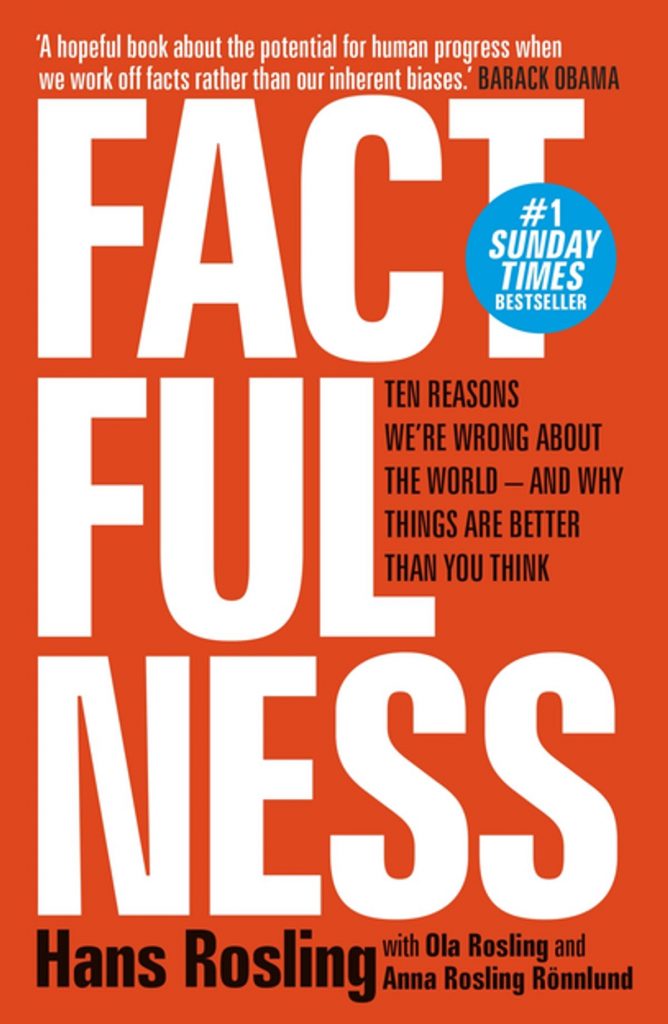
Watching the news gives you the impression that things are worse than they are. But guess what – people’s lives are improving in most categories. Poverty, famine, deaths from disaster, war casualties … all of these, and many others, are improving. For example, 50 % were living in extreme poverty in 1950 compared to 9 % in 2017.
Why you should read it: Besides getting your facts straight about the world, you’ll gain other valuable insights. For example:
- Why the media loves to focus on gaps and extremes in society (“us and them”) when the vast majority are right in between
- Why we tend to blame people instead of the systems that cause bad situations
- How small, seemingly insignificant change grows to something great over the years.
Best takeaway: Watch out for the Destiny Instinct when you think of characteristics of people, countries, religions, and culture. This instinct makes us believe that people and things are constant because it’s challenging to spot slow improvements. Slow improvements are also improvements.
If you want a book on critical thinking and facts about how much the world has improved, this is the book for you.
There’s more on Factfulness here > Quit the News. Think for yourself
5. Influence (Robert Cialdini)
Did you ever look at a product on Amazon with thousands of 5-star ratings thinking “this must be fantastic – that many people can’t be wrong”? What if all those positive ratings were placed, not by real customers, only to impress you with false evidence of the product’s popularity? The thought might have struck you, but you’ll probably still give the ratings the benefit of the doubt.
This is an example of social proof – one of the 6 forces of influence:
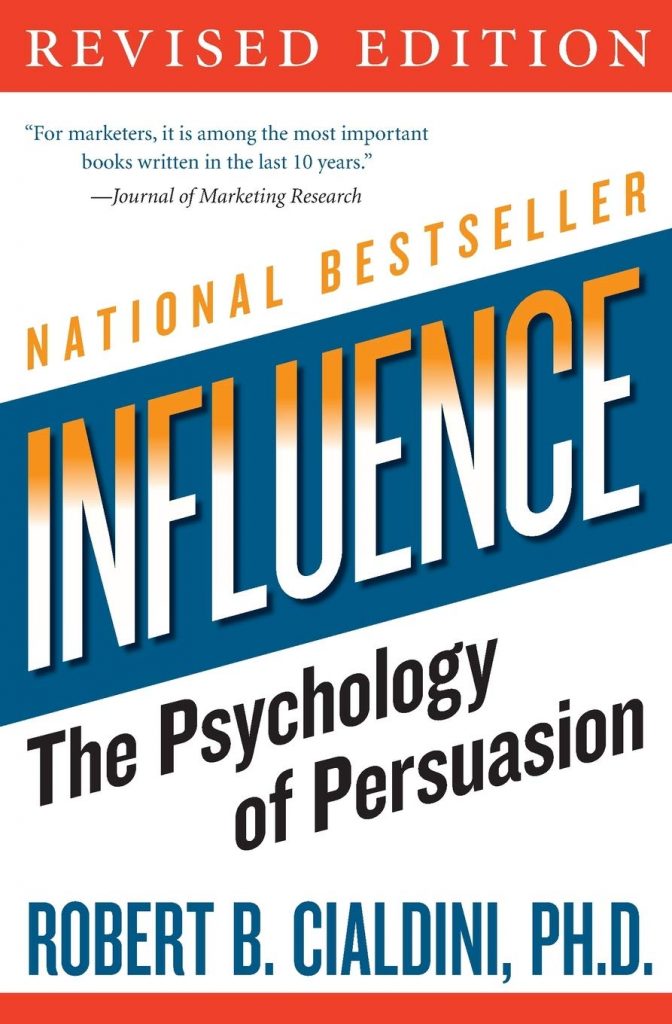
- Social proof – Most people are followers who look for the actions and opinions of others to form their own thinking and determine what is correct, better, and acceptable
- Reciprocation – The rule that we will always try to repay favors almost no matter who provides them
- Consistency and Commitment – It’s important for us to follow through on commitments made to others because we want to be perceived as reliable and consistent human beings
- Liking – We prefer to say yes to attractive people, people that reflect ourselves in any way, and people we know and like
- Authority – People are willing to cross their own line if an authority commands us to do so, even if it feels wrong or counterintuitive
- Scarcity – What is difficult to own is more valuable to us than what is easy to get.
Influence by Cialdini is not an easy read. I advise you to take good notes all the way though to retain the specific examples provided in the book.
If you do take the time, you will get a deep understanding of human psychology and behavior, which is useful for business and your personal life.
Best takeaway: People are generally unsuspecting and have a tough time separating honesty and manipulation because humans will do just about everything to avoid social friction and exclusion from the group.
4. Sapiens (Yuval Noah Harari)
Sapiens is an exciting take on the relatively short history of humanity. You’ll realize that people haven’t evolved as much as we like to tell ourselves – and how we might even have lost quality of life from when we were hunter-gatherers. Ironically, this has happened while we have never been wealthier or had more information at hand.
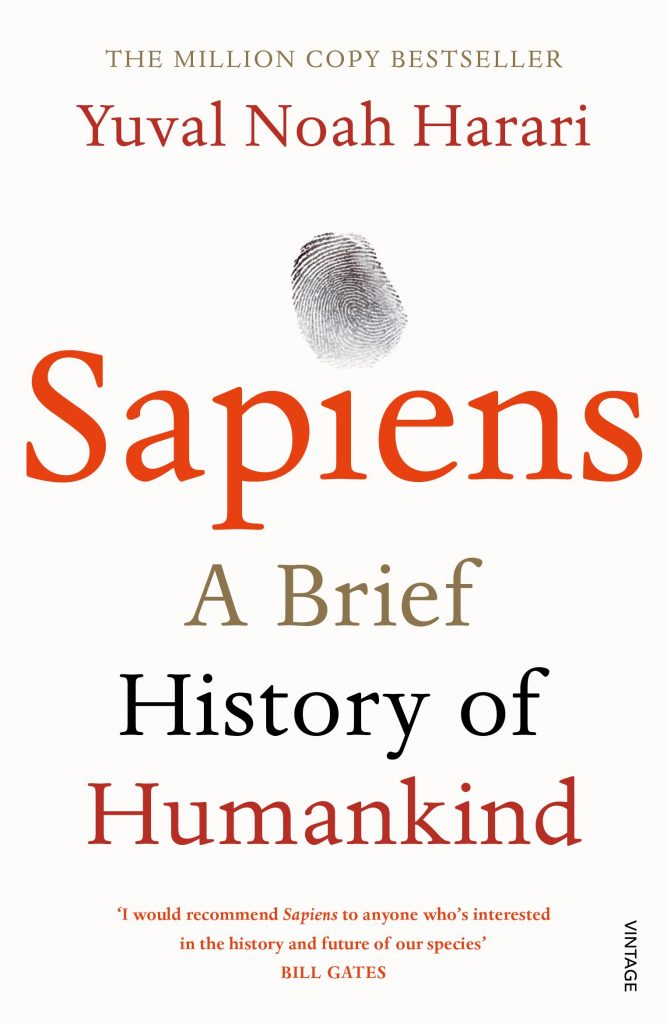
The book presents three important revolutions that shaped history:
- The Cognitive Revolution launched humanity 70,000 years ago
- The Agricultural Revolution created a shift 12,000 years ago
- The Scientific Revolution, about 500 years ago
According to Harari, The Scientific Revolution, which is where we still are, may well end history and start something completely different.
Why you should read it: What makes Sapiens much more interesting than your typical history book is the way Yuval Noah Harari puts the flawed human psyche in historical context. In a way, it’s humbling to read how humanity has always chased the greener grass without really knowing what that looks like.
People have been “building pyramids” since ancient Egypt. Today, it’s a nice house with a big car and vacations abroad. Few questions the myths that cause us to desire these dreams, or modern pyramids, if you will. Young people take on humungous debt after college to get a high-demanding job and work most waking hours. For what? To be able to enjoy life at some later stage.
History has shown that luxuries become necessities, then gets taken for granted to finally become new obligations. In Sapiens, you discover that we haven’t learned much from the Agricultural Revolution. Here, farmers worked harder than hunter-gatherers and got a worse diet in return.
You’ll also get an interesting take on the future, and how humans might (mis)handle all the technology and artificial intelligence, we have created. As you might have guessed, the author holds his breath.
Best takeaway: Large numbers of strangers can cooperate successfully by believing in common myths. There are no gods in the universe, no nations, no money, no human rights, no laws, and no justice outside the common imagination of human beings.
3. Mindset (Carol Dweck)
Author Carol S. Dweck, a Stanford professor, explains how important your mindset is to your success, development, and happiness.
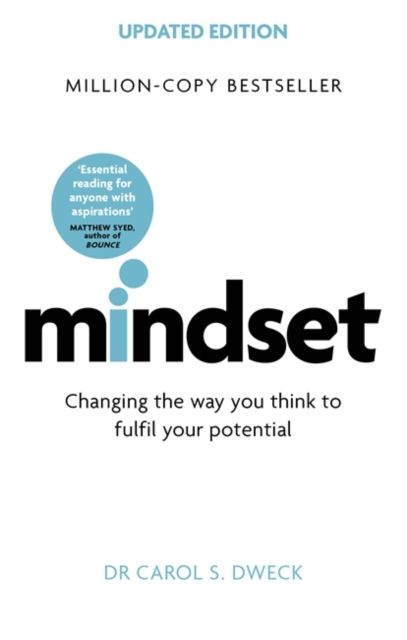
According to Dweck, people with a growth mindset face all challenges with an attitude of learning, reflection and improving. People with a fixed mindset, on the other hand, are limiting their own personal development and fear failure enough to stop them from learning new, valuable skills.
Think you have a growth mindset? Well, you might be less certain after reading Mindset. The good news is that if you’re willing to let go of your ego, and admit your flaws, you can change your personality and mindset for the better and reap the benefits of lifelong growth.
Why you should read it: Mindset explains how our minds work and how to locate the two types of mindsets; in yourself and others. Yes, you’ll also be able to view your kids, spouse, friends, and coworkers in a different light. And you’ll get a great list of questions and signs to spot whether you or others have a fixed or a growth mindset.
Best takeaway: Mindsets are just beliefs. They’re powerful beliefs, but they’re just something in your mind, and you can change your mind.
Read more about Mindset in this article > From Fixed Mindset to a Growth Mindset
2. Atomic Habits (James Clear)
Atomic Habits is THE go-to book if you want to have a practical, honest guide on how to change your habits.
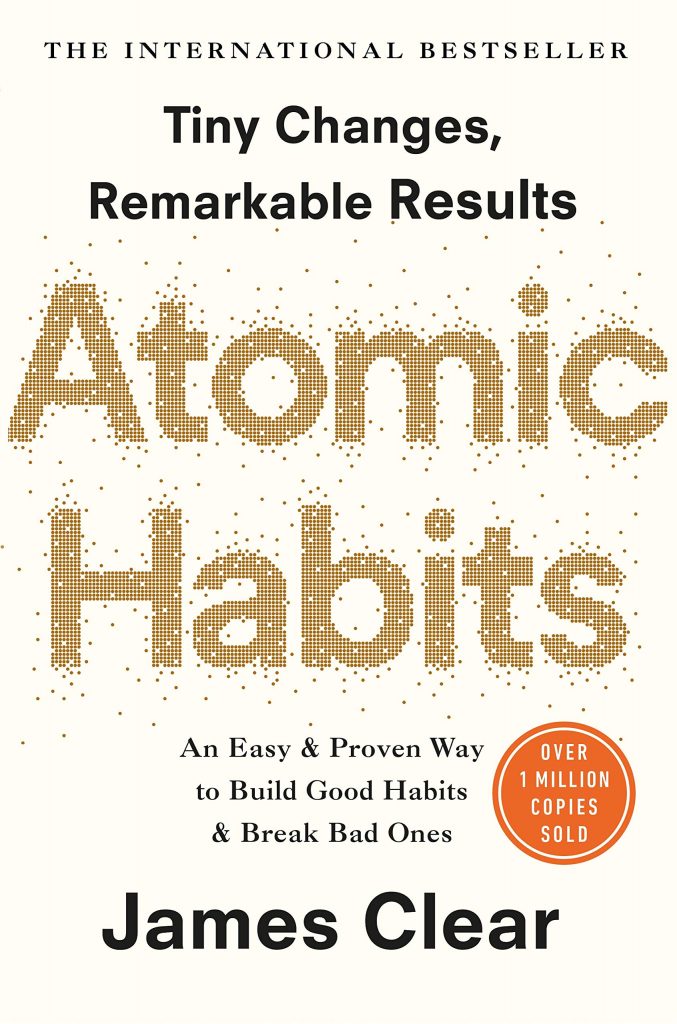
The advice by James Clear is so simple, yet insightful, that you will change your view on how to get results. I certainly can attest to that. With this book, you will see why you haven’t run that half-marathon yet, why you keep snacking, or why you have such a hard time saving money. And best of all – you’ll get the systems to change all these things.
A great example is the Two-Minute Rule: “When you start a new habit, it should take less than two minutes to do.” Your goal might be to run a marathon, but your gateway habit is to put on your running shoes. Then your next move is to walk outside. And off you go.
Why you should read it: Atomic Habits describes how you should move your focus from goals to instead focus more on your systems. While the magnitude of your goals will set a direction, the quality of your systems will determine your progress. Thus, you do not rise to the level of your goals – you fall to the level of your systems.
In its shortest form, it works like this. Your first change your outcomes. Then, you change your process. And finally, you change your identity, which is the dealmaker to secure that your new habit is permanent.
I also recommend The Power of Habit by Charles Duhigg to reinforce these ideas. But I think James Clear and Atomic Habits does the better job in describing how to build better habits in a practical, no BS way.
Best takeaway: Goals are about the results you want to achieve. Systems, more importantly, are the processes that lead to those results.
1. The Compound Effect (Darren Hardy)
Aristoteles once said: “We are what we continue to do”. I can’t credit any book other than The Compound Effect for having such an enormous effect on my daily habits and awareness of the long-term effects of day-to-day actions.
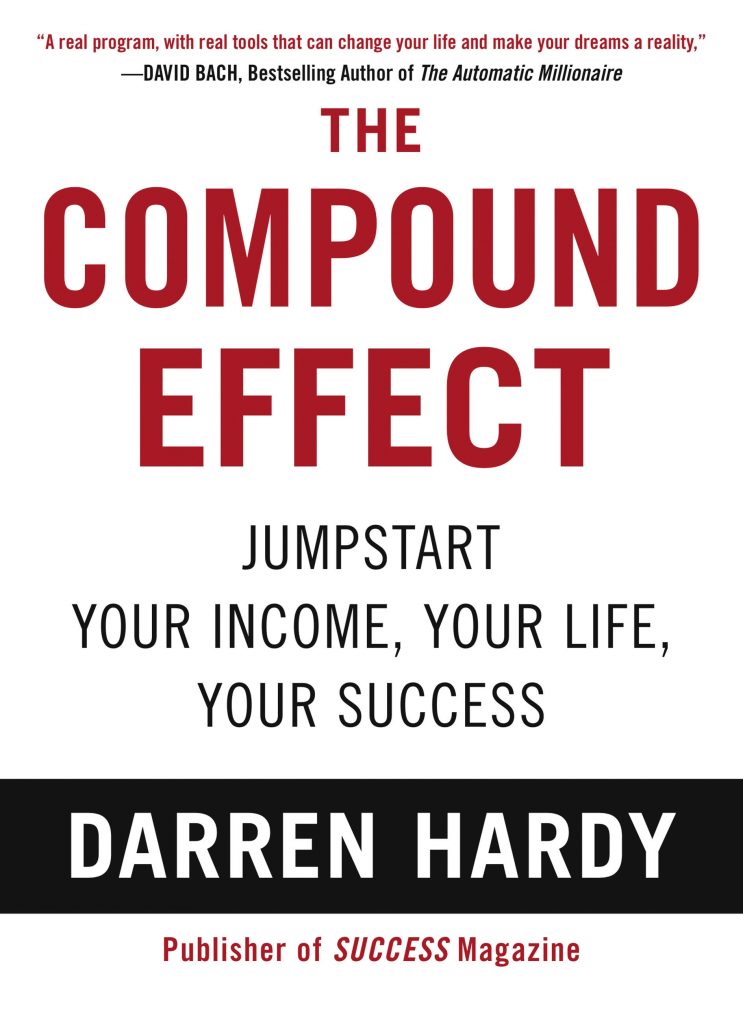
Why you should read it: The Compound Effect is simple, yet very effective. The main idea is that small, smart choices done consistently over longer periods of time gets you bigger, more permanent results.
Read just a little every day, exercise just a little every day, show just a little affection each day. Each thing adds up to massive results over time. The important thing is that you keep showing up every day.
Immediate gratification is your enemy. We tend to do things that feels good in the moment but hurts us in the long while. Other times, we are simply unaware of our bad habits. Consider this: You won’t suffer a heart attack if you eat that extra slice of cake today, but what if you could feel 20 pounds of fat added to your body immediately? Your marriage won’t end because you cold shoulder your spouse today, but what if you saw the future divorce papers on the table in front of you right now?
Habits and results are tied closely to our personality. Most people focus on the wrong part: “WHAT do I have to do to achieve my goal?” The right question is: “WHO do I have to become to achieve my goals?” If you want more, you have to become more.
Best takeaway: The compound effect is always working. It’s the small seemingly unimportant actions you take each day that end up in success or disaster over longer periods.
Want more of the Compound Effect? Head over to this article: 3 Habits That Elevate Your Wealth, Health and Skills
